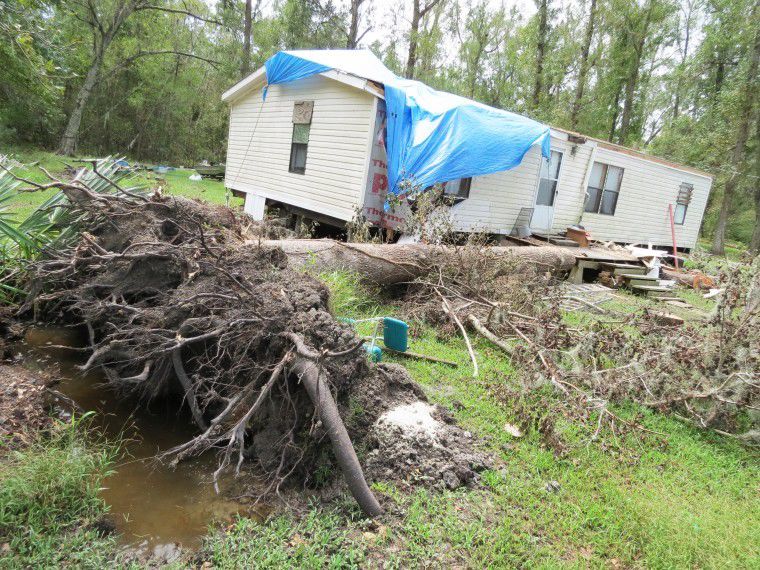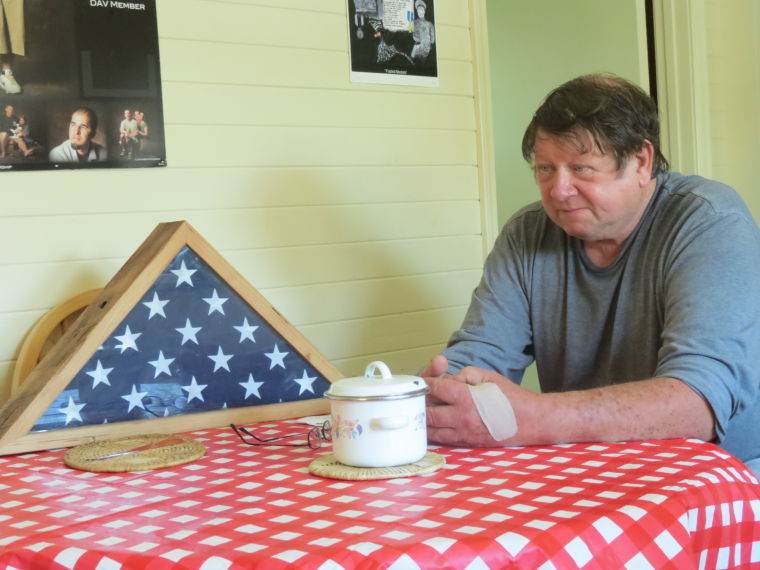
Morganza build progressing: Flood protection system aimed at keeping Terrebonne dry
June 7, 2016
Getting ready for the storm? Now’s the time to develop a plan, gather necessities
June 7, 2016Two major social service challenges, which when combined make for challenges even greater, are being met successfully by Terrebonne Parish, with solutions that are now federally recognized.
Parish President Gordon Dove has announced that TPCG has been certified as the second community in the U.S. to “functionally end veteran homelessness.”
As pointed out by providers in the thick of connecting homeless veterans with meaningful assistance, Terrebonne’s program cannot prevent veterans from living on the streets. But when they do, a verifiable safety net now exists that has proven its effectiveness, and helped provide veterans not only with roofs over their heads when needed, but also support services including jobs and medical aid.
“This is an important victory in our ongoing efforts to make our parish the best place for veterans to live, work and raise a family,” Dove said in a statement issued Friday. “However, we must remain committed to keeping homelessness among veterans rare, brief and non-recurring.”
The announcement is the culmination of efforts that began when Terrebonne Parish committed to First Lady Michelle Obama’s Mayor’s Challenge to End Veteran Homelessness in 2014, and officially pledged to end veteran homelessness by the end of 2015.
Houma-based Start Corporation, the Louisiana Coastal Homeless Coalition’s lead agency, led the effort with parish assistance by using what were termed “evidence-based” tools for prioritizing the needs of homeless veterans. That allowed for rapid emergency housing and permanent housing resources to be made available. Recognizing that housing must come first before other issues such as employment and medical needs can be effectively met, the joint efforts by parish government and the non-profits involved streamlined a system that had perilous cracks, lessening the potential for a veteran being sucked into a chronic state of temporary help followed by a return to homeless status.
‘SERVICE TO OUR
COUNTRY’
Start Corporation Executive Director Casey Guidry said efforts to address the needs of homeless veterans date back to when an anonymous donor paid for the purchase of a veteran’s shelter. The Houma-Terrebonne Housing Authority has networked with the effort to provide actual housing stock.
From Oct. 8, 2015, through March 23, 2016, according to statistics gathered for the program by Guidry, 56 veterans were identified as being homeless.
“That’s an average of nine veterans per month in our area,” Guidry said, expressing pride in the program’s ability to have those men and women hooked up with needed resources within five days of identification.
“That’s what the whole system strives for now,” he said. “We know veterans will continue to become homeless, and now we can address any entering homelessness pretty much immediately. You don’t want these men and women who served to be lingering on the streets. They did a service to our country.”
The effort has gone on quietly, and has included the Veterans of Foreign Wars, the Rotary Club, private network developers, the Terrebonne Parish Department of Housing and Urban Services, the U.S. Department of Housing and Urban Development, the U.S. Department of Veterans Affairs, the U.S. Interagency Council on Homelessness and the Louisiana Housing Corporation.
HOW IT WORKS
Guidry said that among the veterans in need of help recently were some who fought in Iraq and Afghanistan. There are also still veterans of the war in Vietnam who surface. What has essentially occurred is establishment of a network where people most likely to encounter a homeless veteran know to plug in. Law enforcement agencies, the court system, the Veterans Administration clinic and hospitals know to contact Start – or any other component of the program – for an entry and evaluation process to begin.
TPCG’s Darrel Waire, head of the department of Housing and Human Services, said contact may start with a homeless vet getting picked up by the police department, then referred into the program. Various components then address the need for employment while housing options are explored. Meanwhile that veteran can have a temporary stay at the specially designated veteran’s shelter on Grand Caillou Road.
The veteran shelter’s president, Vietnam vet C.J. Trahan, said that much work had been done in the early years of the program by the late Roger Songe, who was instrumental in the shelter’s founding and development. After Songe’s passing last year, Start Corporation took over payment of utilities for the shelter, as well as its insurance.
That freed up time and energy for helpers to do more. Typically, the shelter will steer vets in need to employment opportunities. The Golden Corral restaurant, Auto Zone and Lowe’s are among the companies that have taken the lead in hiring veterans recommended by the shelter and its partner agencies, Trahan said.
CEMETERY SLEEPING
A current shelter resident, a veteran who served three tours of duty in Iraq, is a good example of the wrap-around service model the program’s components provide. The veteran, whom Trahan declined to publicly identify, had lived in the Houston area but was laid off from his job. He traveled to Houma, but in the current local economic downturn, was not successful at finding work, and ended up living on the street.
“The safety net opened up here,” Trahan explained.
For the time being, the Iraq veteran is being provided meals, a place to stay and clothing, as well as a washer and dryer. His company is supposed to be re-opening some operations in New Orleans, and preparations for him to be permanently situated are already in the works.
Although that veteran is not home-grown in the Houma or Thibodaux area, most who receive services are, note Trahan and Guidry.
The level of crisis varies, but in some cases they are heart-breaking. One veteran was aided after Roger Songe found him sleeping in a cemetery. Others lived under bridges or couch-hopped.
Because the veterans are triaged through START, underlying problems such as addiction or mental illnesses can be addressed while emergency services are given, so that the client is prepared to enter the workplace. In the past, some veterans have found employment while staying at the shelter, only to have alcoholism or addiction enter the picture and place them right back where they were.
LOCAL DONORS A HELP
Such problems, while certainly present in the population of homeless veterans, are certainly not universal. Each man and woman has his or her own story. The job of the safety net is to address each individually, rather than through a cookie-cutter approach.
Other examples of the community at large helping out at various stages in the program include a veteran who had flat feet, which limited his employment opportunities. Some local businesses chipped in to get him special shoes, and Scurlock Corp. donated a brand new bicycle so that the man could commute to and from a job.
The threat to employment that PTSD and other brain disorders pose are well understood by C.J. Trahan, who served from 1966 to 1967 in Vietnam, as part of the 25th Infantry Division. Home of the Tropic Lightning Brigade, the 25th saw heavy action.
When he returned home from the search and destroy, ambush and patrol duties that were his unit’s staple jobs, Trahan found adjustment difficult.
In his first year back, Trahan said, he had collected 25 W-2 forms, meaning at least 24 jobs begun and then lost due to problems getting along with people.
This experience, similar to the story Roger Songe told about himself, helps Trahan identify easily with the veterans he now assists.
Among veteran advocates with praise for the Terrebonne model is Fernando Rivera, the Southeast Louisiana Veterans Health Care System director.
“The VA has made ending homelessness among veterans a top priority, and here at Southeast Louisiana VA we are committed to this goal and are thrilled with the results achieved in Terrebonne Parish,” Rivera said. “By working with our community partners here in Terrebonne Parish and throughout Louisiana, VA has made a deliberate effort towards ending veteran homelessness. I can assure the community that continued follow-on efforts will take place to make sure the goal is maintained.” •












